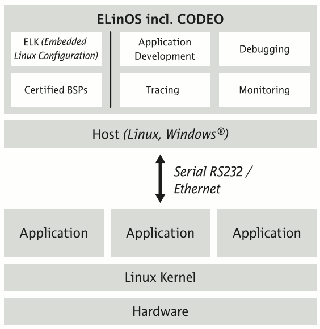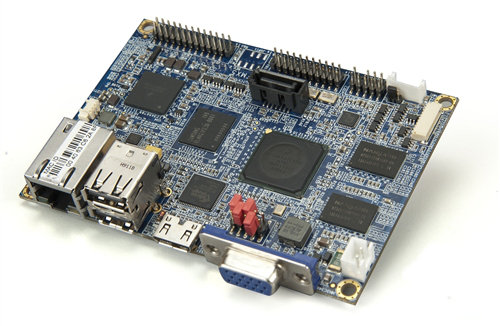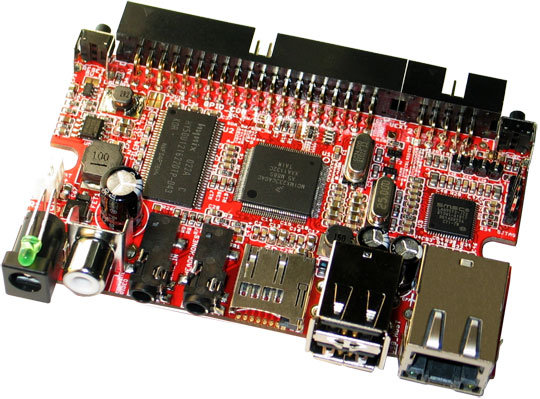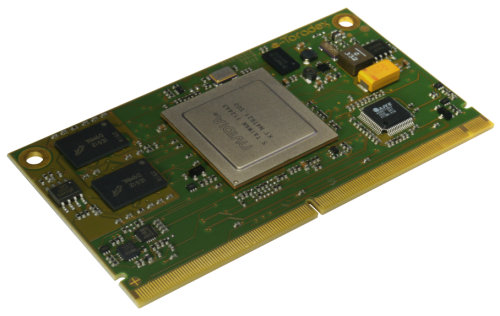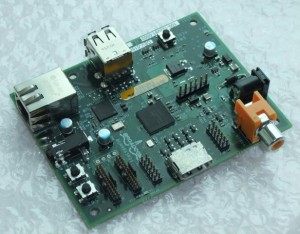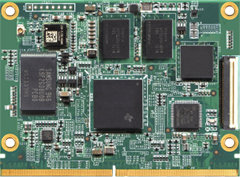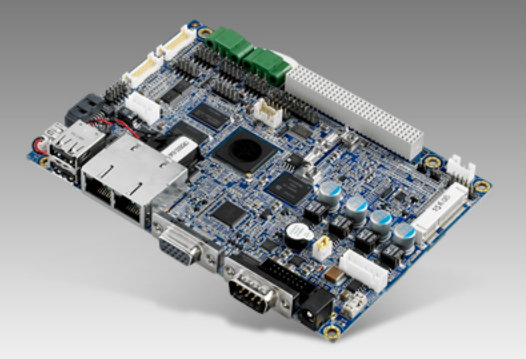SYSGO, a software company for the real-time and embedded markets, has announced the release of ELinOS 5.2, an Industrial Grade Linux distribution, updated to kernel 3.2 and with new features related to scheduling, memory management, file systems, networking and security. The new 5.2 version brings the following improvements: Integration of new kernel 3.2 to support new features and availability of previous versions of kernels 2.6.33 and 2.6.34, to respond to customers demand. Real-time extension based on Open Source Automation Development Lab (OSADL) implementation (PREEMPT RT) especially designed and tested for industrial needs. Support for latest embedded CPUs including Intel, Freescale QorIQ, ARM Cortex, TI OMAP 4, Freescale i.MX6 and MIPS. SMP (Symmetric multiprocessing) support on all multi-core platforms. QEMU simulator supported for all architectures. New functionality support in areas of graphics (i.e. AMD Llano Fusion APUs), Wi-Fi (i.e. Intel iwlwifi 105 and 135), SATA (i.e. Intel C600 serial-attached-scsi controller), USB […]
VIA Announces VIA VAB-800 Pico-ITX Board Based on Freescale i.MX537 Processor
VIA Technologies has announced the VIA VAB-800 Pico-ITX board powered by a Freescale i.MX537 (ARM Cortex A8) processor clocked at 800MHz or 1GHz depending on the requirements, with 1GB DDR3-800 SDRAM and support for eMMC Flash with a capacity of up to 64 GB. The VIA VAB-800 is an industrial board that can operate in a wide temperature range and targets high-end industrial and in-vehicle embedded applications. Here are the specs of the board: Processor – Freescale Cortex-A8 single core iMX537 @800MHz System Memory – 1GB DDR3-800 SDRAM, using 128M x16 memory devices Flash – eMMC Flash, up to 64GB Graphics – Supports two independent, integrated graphics processing units: an OpenGL® ES 2.0, 3D graphics accelerator and an OpenVG™ 1.1 2D graphics accelerator Ethernet – SMSC LAN8720A 10/100 PHY transceiver with HP Auto-MDIX support Audio – Freescale SGTL5000 low power stereo codec with headphone amp HDMI – Silicon image SiI9024A […]
Olimex Offers Up to 50% Discount on OLinuXino Boards to Open Source Developers
Olimex has been providing low cost MCU devkits for many years, and this year they started offering more powerful embedded Linux development boards called OLinuXino. The first family (iMX233-OLinuXino) is based on Freescale i.MX233 ARM9 processor @ 454 Mhz and comes in three form factor: iMX233-OLINUXINO-MAXI – 2x USB host, Ethernet, TV-out, GPIOs, SD-CARD, Audio-In, Audio-Out, UEXT – 44.95 Euros. iMX233-OLINUXINO-MINI – 3x USB host, TV-out, GPIOs, SD-CARD, Audio-In, Audio-Out, UEXT – 34.95 Euros iMX233-OLINUXINO-MICRO – USB host, TV-out, GPIOs, SD-CARD, ready for breadboaring – 23.95 Euros They are also working on A13-OLinuXino board featuring AllWinner A13 Cortex A8 processor. To promote their new boards (and reward open source developers – cf comment below), the company company has decided to offer discount to open source developers. The way I understand it: you need to buy a board first, publish the source code somewhere and write about it on your own […]
Toradex Releases Apalis Computer on Module Architecture Specification
Last month, Toradex released the preliminary specification for Apalis, a Computer on Module (CoM) architecture. Although the Apalis specification has been initially designed with ARM based processors in mind such as the Nvidia Tegra, Freescale i.MX and Texas Instruments OMAP processor families, it aims at being device and chip architecture independent. The Apallis specification defines the following: Interface Specifications: Signal Naming Convention – Rules to name pins (e.g. VCC, PWM1, PWM2, ) which are used for all modules. Signal Definition – Details about the pins named above Physical Pin Definition and Location Mechanical Specifications: Mounting and Fixation Module Size – Standard: 82 x 45mm | Extended: 82 x 56mm Pin Numbering – There is a total of 321 pin numbers (but a few less actually pins) Electrical Specifications: Power Supplies Power Control Back Feed Protection This specifications also defines mounting mechanisms for active cooling (e.g. heat spreaders) in case those […]
List of 39 Low Cost Linux Friendly Boards and Products
Dmitry (omgfire), one of my awesome readers, compiled a great tabular list of Linux friendly boards and products that sells for less than $300 US (usually less than $200). This list includes technical details such as the processor, GPU, memory, NAND flash, connectivity, ports, supported Linux distributions… as well as availability and pricing information. There are currently 39 Linux devices in total. The vast majority are ARM based boards, but he also included 2 x86 products by VIA, but those are relatively pricey ($265 and up). Here’s a summary list with SoCs used, links to blog posts and product pages (if available), as well as price information. Raspberry Pi Model B – Broadcom BCM2835 (ARM11) – Blog post (That’s my first post about the R-Pi last year, and the board is much different now) – Product page – Price: $35 + shipping Rikomagic MK802 – Allwiner A10 (Cortex A8) – […]
TechNexion EDM Modules: Open Software and (somewhat) Open Hardware ARM & x86 CPU Modules
TechNexion, a Taiwanese “embedded solution” company, was present at Computex 2012 showcasing their ARM & x86 CPU Modules and corresponding development kits. The company recently created the EDM Standard, an open hardware and software standard for x86 and ARM Computer on Modules available under the creative commons share alike license. Their EDM modules come in three form factors: EDM Compact: 82 x 60 mm (ARM only) EDM Standard: 82 x 95 mm (ARM and x86) EDM Extended: 82 x 145 mm (x86 only) They have already designed 5 modules based on this standard: EDM-CF-iMX6 EDM Compact Module powered by Freescale i.MX6 (solo, dual or quad) EDM-CT-AM437x EDM Compact Module powered by TI Sitara AM437x (single core Cortex A9) EDM-SF-iMX6 EDM Standard Module with Freescale i.MX6 EDM-ST-AM437x EDM Standard Module with TI Sitara AM437x EDM-XI-QM77 EDM Extended Module with Intel QM77 3rd generation i3/i7 core I could not find information about […]
Advantech RSB-4210: Freescale i.MX53 Single Board Computer
Advantech has just launched the RSB-4210, a fanless and heatsink-less RISC Single Board (RSB) powered by Freescale i.MX53 (Cortex A8) with 512 MB DDR3 and 2 GB NAND Flash. This board can operate in industrial temperature range (-40 to 85° C) and targets industrial control, digital signage, HMI/kiosk, medical, and portable applications. Here are the key features of this board: Freescale ARMCortex-A8 i.MX536 @ 800MHz Supports OpenGL ES 2.0 and OpenVG 1.1 hardware accelerators Supports full HD 1080p video decode and HD 720p hardware video encode Video Output LCD support with resolution up to 1920×1080 (default 800×480) via LVDS connector HDMI VGA Touch, UART, I2C, I2S, SPI, GPIO, USB Supports SATA storage interface and CAN-bus for vehicle applications Dimensions – 146 x 102 x 20 mm Power – 9 ~ 24 V DC with 3-watt power consumption Operating temperature – -40 ~ 85° C If you don’t mind about the […]
Linaro 12.05 Release with Kernel 3.4 and Android 4.0.4
Linaro has just released version 12.05 based on Linux Kernel 3.4 and Android 4.0.4. This release provides lots of improvement for Origen (Samsung Exynos 4) on Android, further work has been done on big.LITTLE processing and ARMv8 work appears to have started for Ubuntu and Debian. armel vs armhf benchmarks show a massive improvement (up to 15x) when using armhf for povray (3D rendering),. but for most other tests, there is little improvement, and in some rare cases armhf is slightly slower than armel. Here are the highlights of the release: Android Created a stable Google hangout build for Origen Updated DS-5 and gator daemon to 5.10 Stress tests from big.LITTLE testing have been integrated into LAVA Completed big.LITTLE Android tasks Monkeyrunner tests for automating common Android usage have been integrated into LAVA Ordered a new power measurement device from National Instruments Updated and Origen 3.4 rc7 Completed Android HAL […]


